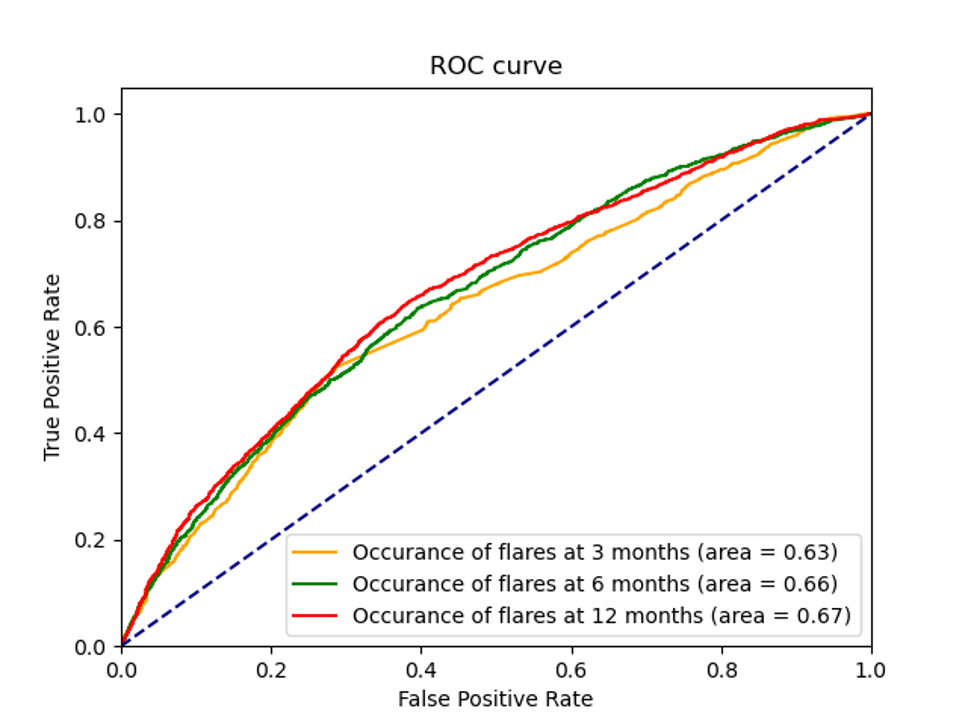Session Information
Date: Tuesday, November 14, 2023
Title: (2257–2325) SLE – Diagnosis, Manifestations, & Outcomes Poster III
Session Type: Poster Session C
Session Time: 9:00AM-11:00AM
Background/Purpose: Systemic lupus erythematosus (SLE) has a relapsing-remitting course, with patients experiencing disease activity flares over time. Flares and prolonged disease activity are associated with progressive multi-system organ damage, poor quality of life, high healthcare costs, and increased mortality. Disparities have also been widely reported in the health care access and health outcomes among patients with SLE, and social determinants of health (SDoH) are often considered as the root causes of health disparities. However, existing studies evaluating SLE flares and disease activities have not yet considered SDoH or patients’ social risks. The objective of this study is to incorporate both patients’ clinical characteristics and SDoH and develop an electronic health record (EHR)-based machine learning prediction algorithm for SLE flares to support real-time clinical decision-making, address social risks and SDoH, and ultimately reduce health disparities of SLE.
Methods: OneFlorida+ network is part of the national Patient-Centered Clinical Research Network (PCORnet), collating EHR data from 17 million residents in Florida, 2.1 million in Georgia, and 1.1 million in Alabama. We identified adult SLE patients using 2013-2021 OneFlorida+ data and spatiotemporally linked the cohort with 486 neighborhood SDoH (e.g., neighborhood unemployment rate and median income). A validated surrogate measure of SLE Disease Activity Score 2000 (SLEDAI-2K) based on the EHR data was calculated for each 30-day period over the baseline year and follow-up year. The median score for the first 12 months was used to establish a baseline level of disease activity; and a flare was defined as an increase of at least 4 from the baseline score. We incorporated SDoH and patients’ clinical characteristics (e.g., medical diagnoses, prescriptions, and lab results) collected at baseline year and employed a gradient boosting machine to predict the occurrence of flares at 3 months, 6 months and 12 months after baseline.
Results: We identified 33,151 eligible SLE patients; the mean age was 45 (std: 16) years, 89% were females, and 39%, 26%, and 25% were non-Hispanic White, non-Hispanic Black, and Hispanic race/ethnicity, respectively. Of the cohort, over one-third (39%) developed at least one flare during the follow-up year; 19%, 9%, 4%, and 6% experienced 1, 2, 3, and 3+ time(s) flares during the follow up year. Our algorithm showed a good utility for predicting individuals’ risk of flares, achieving a C statistic (standard deviation) of 0.63 (0.01), 0.66 (0.01), and 0.67 (0.01) at the 3- month, and 6- month, and 12-month period, respectively (Figure).
Conclusion: By incorporating both SDoH and clinical data, our EHR-based algorithm shows promise for identifying likely flares in real-world patients with SLE. Future studies are needed to identify key SDoH causally associated with flares occurrence to identify intervention targets that improve both health outcomes and health disparities in patients with SLE.
To cite this abstract in AMA style:
Huang Y, Yao L, Fan z, Guo J, Bian J. An Electronic Health Record-Based Algorithm for Predicting Systemic Lupus Erythematosus Flares: Integrating Clinical Factors and Social Determinants of Health [abstract]. Arthritis Rheumatol. 2023; 75 (suppl 9). https://acrabstracts.org/abstract/an-electronic-health-record-based-algorithm-for-predicting-systemic-lupus-erythematosus-flares-integrating-clinical-factors-and-social-determinants-of-health/. Accessed .« Back to ACR Convergence 2023
ACR Meeting Abstracts - https://acrabstracts.org/abstract/an-electronic-health-record-based-algorithm-for-predicting-systemic-lupus-erythematosus-flares-integrating-clinical-factors-and-social-determinants-of-health/

